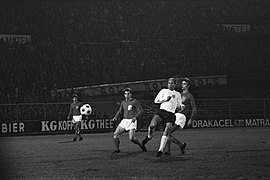“There’s only one Bobby Charlton”

October 22 2023, 4.30pm. Over 42,000 nervous and boisterous football supporters are packed into Birmingham’s Villa Park, hotly anticipating kick-off in the Premier League clash between West Ham and Aston Villa. Two perennial sleeping giants of English football currently both in rich veins of form, with the upper echelons of the table firmly in their sights. The atmosphere is febrile and excitable, yet out of nowhere, the ground collapses into deafening silence.
That silence was brought about from an announcement in the stadium signalling the beginning of a minute’s silence for former Manchester United, Preston North England, and England attacking midfielder Sir Bobby Charlton – who had sadly passed away the previous day. For just a brief 60 seconds, the cut-throat climate of the Premier League dissipated, and the only sound that filled the autumnal Midlands air was a chorus of “there’s only one Bobby Charlton”.
The term “legend” gets thrown around far too regularly in modern football, but for Sir Bobby Charlton, its truth is beyond question. On the pitch he was a mercurial talent and is undoubtedly one of the greatest English players of all time. Clocking in at an astounding 752 appearances in professional football, he scored 199 times for Manchester United – a club record that stood for over 40 years until 2017 – and 49 times for England – a national record that stood until 2015, see his career statistics here.
 Charlton with England teammate Jimmy Greaves in 1964. Credit: Fotocollectie Anefo @ Wikimedia Commons
Charlton with England teammate Jimmy Greaves in 1964. Credit: Fotocollectie Anefo @ Wikimedia Commons
Charlton was also not short on winners medals, winning three First Divisions, an FA Cup, a European Cup and a FIFA World Cup – as he was part of the team that won England’s only ever international accolade in 1966 – alongside picking up personal honours such as the FIFA World Cup Golden Ball, and the 1966 Ballon D’or – making him one of only six British footballers to be recognised as the greatest player on Earth over the course of a calendar year.
Furthermore, he was also one of football’s great entertainers, a man who brought dazzle and excitement to fans across the country and the world in the 1960s and 1970s – the age in which football first began to hit the small screen. A trait characterised by feats such as his wonder goal for England against Portugal in the 1966 World Cup Semi-Final, and his hat-trick for Manchester United against Borussia Dortmund in the 1964 European Cup in two of his greatest moments.
 Charlton facing off against Netherlands left-winger Rob Resenbrink in an appearance for England in 1969. Credit: Eric Koch for Anefo @ Wikimedia Commons
Charlton facing off against Netherlands left-winger Rob Resenbrink in an appearance for England in 1969. Credit: Eric Koch for Anefo @ Wikimedia Commons
But there is so much more to Charlton’s life and achievements than simply his footballing talent and the honours that he won, which is what serves to truly make him an icon of British football.
Charlton was a true example of a footballing rags to riches story. Alongside his brother Jack – who was also a professional footballer, playing 629 times for Leeds United and also being part of the fabled 1966 England World Cup squad. He rose from the impoverished town of Ashington in Northumberland – where his father worked as a miner – to well and truly conquer the world of football. An achievement emotively signified by the pair’s embrace on the Wembley turf after England’s defeat of West Germany in the 1966 World Cup Final.
Additionally, Charlton’s career was also struck by heartbreaking tragedy in it’s early stages as he was aboard the aircraft carrying the Manchester United team back to England from a European away game that crashed on the runway at Munich Airport on February 6th 1958, killing eleven members of the Manchester United travelling contingent. Charlton himself only narrowly survived the crash and had to be rescued by his teammate Harry Gregg. In the years following these horrific events, Charlton fought hard to keep alive the memory of those who passed, and was central to rebuilding the Manchester United team on the pitch, a process that culminated in their 1968 European Cup victory.
 The Munich Clock on the South-East corner of Old Trafford, Manchester, commemorating the Munich air disaster of 1958. Credit: PeeJay2K3 @ Wikimedia Commons
The Munich Clock on the South-East corner of Old Trafford, Manchester, commemorating the Munich air disaster of 1958. Credit: PeeJay2K3 @ Wikimedia Commons
Many English football fans will have also been hit with the depressing realisation upon hearing the sad news on Saturday afternoon that Charlton’s death means that there is only one member of the 1966 World Cup winning side – Geoff Hurst – who is still alive, showcasing how England’s greatest generation of footballers is slowly being consigned to the annals of history.
Manchester, Ashington and England have lost one of their greatest sporting sons. In the words of the West Ham and Aston Villa fans on Sunday, “there’s only one Bobby Charlton”. Rest in Peace.







